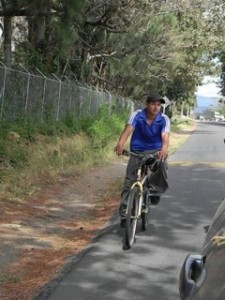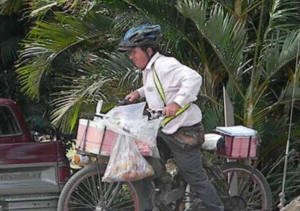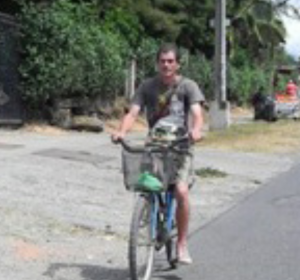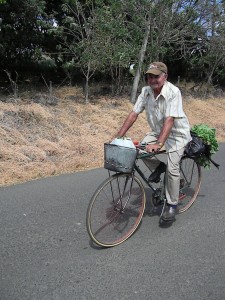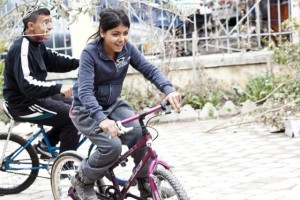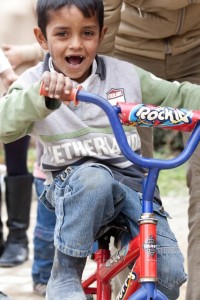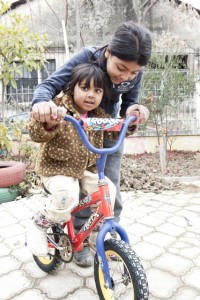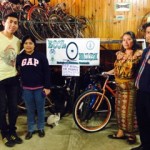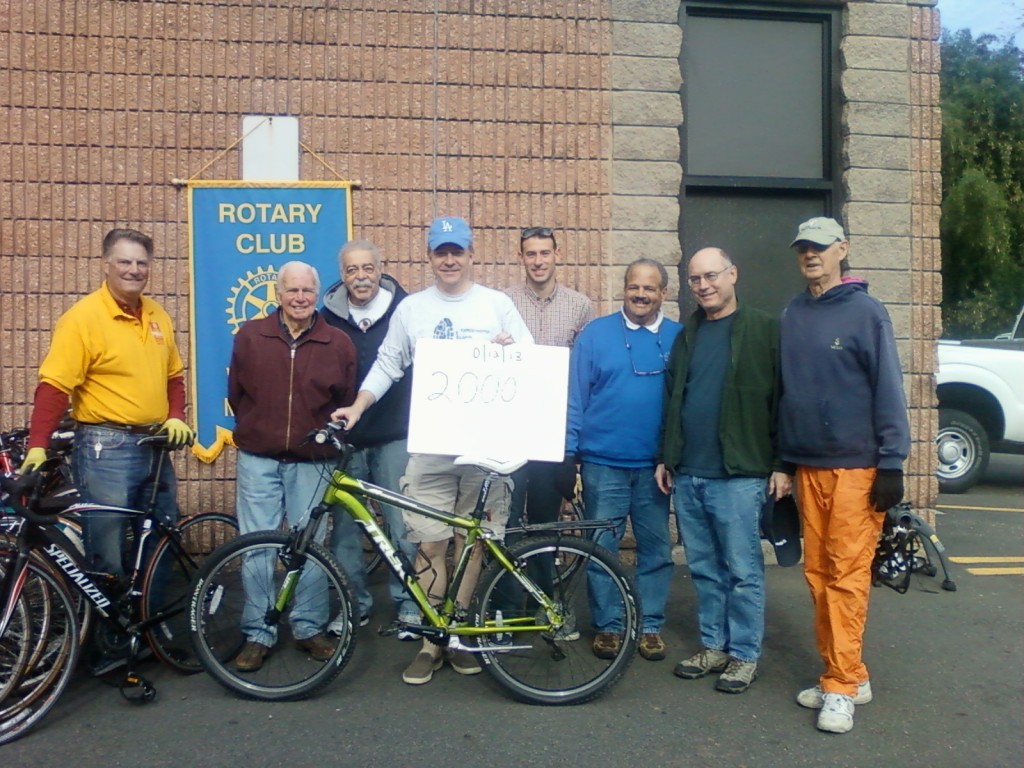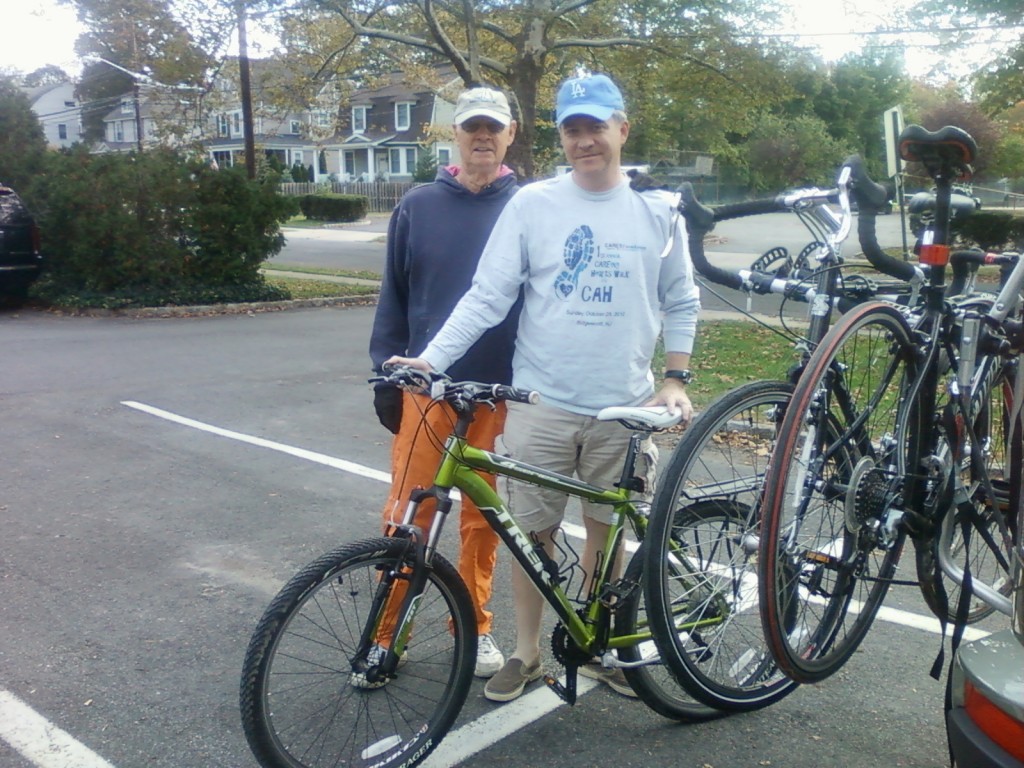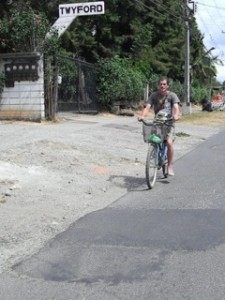 Due to its warm, sunny climate, Tacares de Grecia in the Alajuela Province is one of Costa Rica’s main areas for growing tomatoes, the dry season being the most suitable for planting crops. The Miranda Family owns a small plot for producing tomatoes. They distribute and sell their goods through roadside vendors as well as deliver tomatoes directly to customers using bicycles outfitted with baskets, charging 1000 colones (approximately $2.00) for every 2 kilos of tomatoes.
Due to its warm, sunny climate, Tacares de Grecia in the Alajuela Province is one of Costa Rica’s main areas for growing tomatoes, the dry season being the most suitable for planting crops. The Miranda Family owns a small plot for producing tomatoes. They distribute and sell their goods through roadside vendors as well as deliver tomatoes directly to customers using bicycles outfitted with baskets, charging 1000 colones (approximately $2.00) for every 2 kilos of tomatoes.
Category Archives: bicycles
Thank you from Moldova
Dear Friends, Family and Supporters,
We are all so happy to be sending out this short video to thank you for your generous contributions to our Indiegogo campaign to get Tudor, Tamara, and Inesa to the USA for the Final Pitch of the Diamond Challenge 2014.
While here, the group will partake in many start-up related activities with other youth from America, go to a good old American baseball game (and throw the opening pitch!), visit the cities of Newark, Wilmington, Philadelphia, and New York, and meet with leaders from amazing organizations, from StumbleUpon to the United Nations!
There will also be a visit to the coastline and a chance for them to share their cooking schools in preparing a “masa” (this means table in Romanian) at the home of their Peace Corps mentor Carol’s sister’s home on Long Island.
As each day passes, we are finding more and more support for this exciting visit and cultural exchange opportunity. It wouldn’t have been possible without you and we are so grateful. The impact programs like the Diamond Challenge make on the lives of youth across the globe is incredibly important for the future of our world and we hope you will continue to support such initiatives in the future.
For those of you in the region who are interested to attend the live Final Pitch event in Delaware and to meet Tudor, Tamara, and all of the other talented youth, please visit the online invitation.
Again, may click here to view the video Thank You note!
In deepest gratitude,
The Diamond Challenge Leadership Team
Costa Rica Success Stories
Spring 2014 InGear
23-year old Santiago Romero lives in La Guacima in the Alajuela Province of Costa Rica with his wife and two daughters, who are 1 and 3 years old. Santiago’s wife spends her day at home with the children and additionally takes care of Santiago’s sister’s two kids in the mornings. There are many factories and corporations in La Guacima and its surrounding areas; Santiago works for a hardware company ordering construction materials and recording customer orders. It takes him about 25 minutes on his bike to travel the 5km distance to and from work.
Guillermo Mendoza is a resident of the multicultural Costa Rican city of Limón. As he spends most of his time on his bicycle, making his living selling fresh fish and other food items, he makes certain to keep safe by wearing a helmet and reflective vest. Guillermo always has the freshest catch. The fishermen of Limón approach him daily to buy his fish to resell at the nearby fish market.
Due to its warm, sunny climate, Tacares de Grecia in the Alajuela Province is one of Costa Rica’s main areas for growing tomatoes, the dry season being the most suitable for planting crops. The Miranda Family owns a small plot for producing tomatoes. They distribute and sell their goods through roadside vendors as well as deliver tomatoes directly to customers using bicycles outfitted with baskets, charging 1000 colones (approximately $2.00) for every 2 kilos of tomatoes.
Juan Rodríguez is 72 years old. He and his wife own a small plot of land (about 200 square meters) in the outskirts of San Ramón, a city in the Alajuela Province of Costa Rica. Juan and his wife use their spare time to plant cilantro and celery. Juan’s bicycle allows him the time he needs to grow his crops. With it, he can get around his neighborhood and sell his produce easily and with no transportation costs.
Diamond Challenge Moldova
Bicycles Become Instrumental in Saving an Endangered Region in Nicaragua
Spring 2014 InGear
An enormous amount of our work here at P4P is based on reaching out to people and organizations for the support we need to keep our bike collections a success and our partners supplied with cycles and parts for maintenance and repair. When an organization initiates the contact, it tells us our efforts are working and we are making a difference. Most recently, it was Fumiji Aoki of the Turtle Conservancy offices in New York City who contacted David Schweidenback to arrange the collection and shipping of bicycles to rangers working for Paso Pacifico in southwestern Nicaragua. The difficulty in navigating the rough roads and changing terrain over long distances on foot or in the rarely available buses in this region make reliance on bicycles essential. P4P immediately got to work filling this need.
![Rangers and bicycles for Christmas[3]](https://www.p4p.org/wp-content/uploads/2014/01/Rangers-and-bicycles-for-Christmas3-300x197.jpg) We reached out to Kate Dolkas, a conservation associate based in Paso Pacífico’s offices in Ventura California, to fill us in on who is going to be using the bikes and how they will fit into the overall mission of their organization: “Our ranger teams comprise 20 men and women, 12 Forest Rangers and 8 Sea Turtle Rangers. All Paso Pacífico rangers are local residents of southwestern Nicaragua and many of them work as farmers or 2-3 hours away in Managua in addition to their employment with us.
We reached out to Kate Dolkas, a conservation associate based in Paso Pacífico’s offices in Ventura California, to fill us in on who is going to be using the bikes and how they will fit into the overall mission of their organization: “Our ranger teams comprise 20 men and women, 12 Forest Rangers and 8 Sea Turtle Rangers. All Paso Pacífico rangers are local residents of southwestern Nicaragua and many of them work as farmers or 2-3 hours away in Managua in addition to their employment with us.
“The rangers work in the Paso del Istmo, a narrow isthmus of land in southwestern Nicaragua between Lake Nicaragua and the Pacific ocean. This area is characterized as dry tropical forest where an intense rainy season is followed by extremely dry conditions every year. Rich in biodiversity and a crucial corridor for birds, mammals and amphibians, it has been devastated by extreme deforestation, resulting in habitat destruction and migratory corridor disruption. Tourism is also increasingly affecting beach areas.
“Our forest rangers hike through dense dry tropical forest to monitor sites for signs and sightings of spider monkeys, migratory birds and parrots, amphibians and small mammals. They collect and analyze population data to provide us with baseline information about each species and help us understand how to better protect them from deforestation and climate change.
“The sea turtle rangers are instrumental in protecting the declining sea turtle populations that rely on Nicaragua’s beaches year after year to lay their eggs. They are responsible for patrolling beaches that are prime nesting sites for Olive Ridley, Hawksbill, Leatherback, and Green sea turtles. Turtle egg poaching is a common illegal activity in Nicaragua, and the rangers help to combat against this practice by patrolling the beaches at night when turtles lay their eggs and by implementing our incentive program in which poachers receive money in exchange for the eggs they attempt to steal. Sea turtle rangers also care for nests in Paso Pacífico’s sea turtle hatcheries, where they record the number of eggs that successfully hatch and the baby sea turtles that then make it to sea.
“Having the bikes is so special because all of our rangers live and work in the rural communities of the Paso del Istmo and many of them do not own vehicles or bicycles, causing them to rely on unreliable buses for transportation. The long roads that take them from home to monitoring and patrolling sites are primarily dirt roads that become mud pits in the rainy season and then dry into deep ruts carved out by large trucks and livestock.
“Prior to the P4P bike donations, rangers traveled to monitoring sites on foot, trudging through the mud and dust. Now that they have the new bikes, they can focus their energy on what’s important: Protecting the wildlife of Nicaragua. Thanks to Pedals for Progress, life is easier for the rangers who can now do their jobs more effectively.”
This is the kind of partnership P4P hopes to continue to develop and sustain across the globe. As long as we keep up our efforts and can respond to the growing need internationally for economic and ecologically viable transportation and employment options, we know we are making the right kind of mark on the planet.
House of Colors – Albania
Dear David,
This Christmas we donated another 20 bicycles to “Shtwpiza e Ngjyrave”, “House of Colors”. This house is a kids’ center that hosts more than 120 children every day. These children are in a “street situation”, working and begging. “Make them smile” is the campaign of bike donations. This is the seventh kids’ center P4P bicycles have supported, with more than 100 children’s bicycles, used by more than 600 poor, abandoned children. Our volunteers have scheduled every Wednesday to spend 1 hour at these centers to teach them cycling and have a good time together. Yes, together we can “make them smile again”.
Best wishes for 2014,
Sincerely
Ened
ECOLOBICI – Holiday Message
We recently received a great holiday email from our Guatemalan Partners ECOLOBICI:
Hi David,
We have just finished the inventory of our last container. The shipment looks great with the sewing machines that will go to a women’s group in a community outside of San Andrés Itzapa. The shipment of parts and soccer equipment will also go to great use. Everyone is excited for the upcoming World Cup in Brazil this summer.
Please see some photos below and wishing you and your family a happy new year.
Your friends at FIDSEMA – ECOLOBICI.
Final Capital Campaign Update
When I won the Rolex award in 2000, I convinced the Board to start a Capital Campaign for building a permanent facility. While we raised significant funds, we never met our goal. Furthermore it has since been decided our resources are better off helping people, than owning a facility and we have excellent rental space. When the banks collapsed in 2007 we had approximately $110,000 in the capital campaign. I wrote to all the donors and requested that they release that money so that we could use it for general expenses. Most donors released their donation. Those funds helped us stay operational through the entire recession.
There is however $10,411 that has never been officially released by the donors. In part because of how long ago these funds were donated, the addresses we had on file the mail was returned. Further complicated by Hurricane Sandy and multiple computer meltdowns, we no longer even have these bad addresses. It is my belief that these funds were donated by well-intentioned people who wanted their money to go to making a substantive long-term change in society. These funds were dedicated specifically to the Pedals for Progress Capital Campaign. The residual restricted funds could languish on the books of P4P providing no value to anyone. The Board feels that this is specifically contrary to what the donors intended. Furthermore since this money was dedicated specifically for “a” Capital Campaign, it should be used for such.
Pedals for Progress, a New Jersey nonprofit corporation, is hereby posting official notice to all of the original Capital Campaign contributors. If you are one of these original donors, we no longer have your address. Please write or email P4P with your name, address, amount of your donation, and instructions on what to do with your donation. You may instruct that P4P return of the donation to you, or that the donation may be used by P4P to fund ongoing operations without restriction. If we do not hear from you, the remaining Capital Campaign monies will be donated to the Hunterdon Medical Center (HMC) Cardiopulmanary Capital Campaign three months after the posting of this notice. HMC is the local hospital that most of our employees use when necessary. The Board feels that we are fulfilling our duty to the donors by giving this money, first to a capital campaign and, secondly to something that will make a long-term substantive change that we believe remains the intent of the original Capital Campaign donors.
Sincerely,
David Schweidenback
pdls4@comcast.net
Country Update: Ghana
by Joseph Matar
Fall 2013 InGear
Pedals for Progress seeks to stimulate the economy of developing countries through its work. This would be impossible without the cooperation and tireless efforts of its partners throughout the world. One such partner is Wright Enterprises, a company that imports consumer goods to Ghana. Working in conjunction with P4P, Wright Enterprises founded WEBike, an organization that, for little to no profit, distributes bikes and sewing machines to those in need of them. Here is a selection of stories of Ghanaians whose lives have benefited from the work of P4P and WEBike.
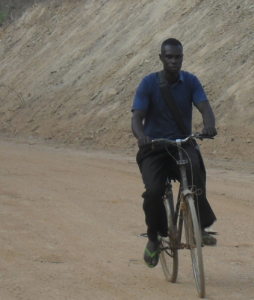 1. Usifu is a student teacher in the small town of Walewale in the Northern Region of Ghana. A limited staff at his school means that Usifu must perform multiple duties. First and foremost, he teaches a fourth grade class. Additionally, before morning lessons begin, the students sweep the classrooms and school compound, a job Usifu must be present for to oversee and provide assistance with. There is a distance of 4 kilometers (about 2½ miles) between Usifu’s home and the school. Having to walk made it difficult for him to arrive before the start of classes to complete his duties in time. Furthermore, traveling by foot daily would leave him exhausted, not to mention would cut into the time Usifu, like any teacher, needed to prepare for upcoming lessons. Now, thanks to WEBike, Pedals for Progress’ partner in Ghana, Usifu rides a bicycle to and from school each day. This drastically decreases his travel time, giving him more of the time and energy he needs to do his job. He can now get to school on the dot and is prepared and focused every day when he enters the classroom.
1. Usifu is a student teacher in the small town of Walewale in the Northern Region of Ghana. A limited staff at his school means that Usifu must perform multiple duties. First and foremost, he teaches a fourth grade class. Additionally, before morning lessons begin, the students sweep the classrooms and school compound, a job Usifu must be present for to oversee and provide assistance with. There is a distance of 4 kilometers (about 2½ miles) between Usifu’s home and the school. Having to walk made it difficult for him to arrive before the start of classes to complete his duties in time. Furthermore, traveling by foot daily would leave him exhausted, not to mention would cut into the time Usifu, like any teacher, needed to prepare for upcoming lessons. Now, thanks to WEBike, Pedals for Progress’ partner in Ghana, Usifu rides a bicycle to and from school each day. This drastically decreases his travel time, giving him more of the time and energy he needs to do his job. He can now get to school on the dot and is prepared and focused every day when he enters the classroom.
2. In some Ghanaian villages, it is common practice for citizens to pursue auto mechanic apprenticeships. It is a worthwhile career track for many people as, once they have become proficient in the field, they can bring their talents to the bigger cities where the need for mechanics can translate into a lucrative job. Paa Joe is a young man hoping to procure such a position. An apprentice in the Suhum/Kraboa/Coaltar District in the Eastern Region of Ghana, Paa Joe must traverse a distance of 5 kilometers (or over 3 miles) to get from his residence to where he is learning his future trade. Formerly, his only transportation option was one very early bus that would get him to his apprenticeship before the workday proper began. If he missed this bus, he was forced to walk. Either approach left him exhausted. After receiving a bicycle from WEBike, Paa Joe became able to bike to and from his auto mechanic apprenticeship every day. Functioning on his own schedule, he is now energized in his work and much more hopeful that he will one day be able to move to the city to begin a profitable career.
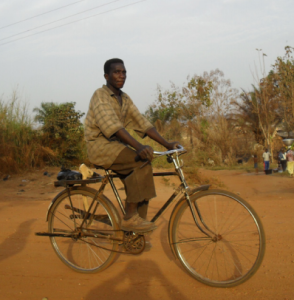
3. Yaw Aboah is a gristmill operator in Kasoa, a suburb in the Central Region. Long work hours and a distance of 3 kilometers (about 2 miles) between his house and his workplace meant that Yaw was often forced to sleep at the mill. Obviously, this was far from ideal as an industrial building hardly possesses conditions conducive to a good night’s rest. Worse, however, was that sleeping at work would mean Yaw would typically not see his family for days at a time and, further, often had to spend money on meals away from home. Thanks to the bike he’s received, staying overnight at the gristmill isn’t even something Yaw has to take into consideration. He is able to bike easily to and from work every day, providing him with a more economical lifestyle and, most important of all, giving him back his time with his family.
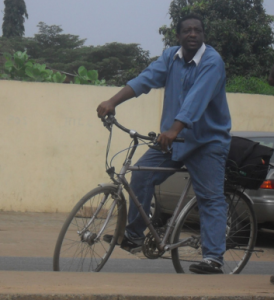 4. Nana Yaw teaches a sixth grade class at the LA Middle School in Nsawam, a town in Ghana’s Eastern Region. He lives quite far away in a small village called Ayakwah, on the outskirts of the Nsawam area. Covering this distance daily was a huge issue for Nana, but then he received the gift of a bike from WEBike. He can now go between school and home much faster and with much less effort. He is thankful to WEBike for this, as well as for providing him with the means to perform various errands and to travel around the area with ease.
4. Nana Yaw teaches a sixth grade class at the LA Middle School in Nsawam, a town in Ghana’s Eastern Region. He lives quite far away in a small village called Ayakwah, on the outskirts of the Nsawam area. Covering this distance daily was a huge issue for Nana, but then he received the gift of a bike from WEBike. He can now go between school and home much faster and with much less effort. He is thankful to WEBike for this, as well as for providing him with the means to perform various errands and to travel around the area with ease.
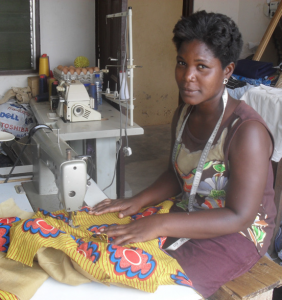
5. Coming from a poor background, Ama Attah became a seamstress’ apprentice, hoping to learn and eventually use the skill to improve her family’s financial standing. However, shortly after the completion of her apprenticeship, Ama’s sewing machine was one day accidentally knocked from a table to the ground, damaging it beyond repair. As a result of WEBike’s intervention, Ama received another, working sewing machine. She is overjoyed that she can now put the sewing skills she worked so hard to learn to use and can make money to support herself and her family.
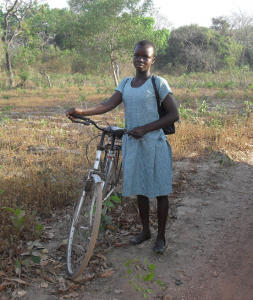 6. Esi is a teenager who lives in a small village in the Nkwanta North District of the Volta Region. She is a student at Nkwanta Senior High School. The school is located so far away from where Esi lives that it would take her two hours to walk there. With the school day beginning at 7AM, Esi had no choice but to be up every morning well before 5 in order to be sure to get to class on time. Furthermore, the road she travels on is frequently a busy one, making her daily trek all the more arduous and slow-going. All of these factors contributed to Esi’s fatigue, which was obviously detrimental to her health, especially at a developmental age. It also made it difficult for her to be attentive during school and hard for her to dedicate energy to schoolwork in and out of class. After receiving her bicycle from WEBike, Esi found she was able to negotiate the distance between school and home within an hour, sometimes even managing it in 45 minutes. She is no longer unnecessarily exhausted and is sure to be on time, prepared, and fully alert in class each day.
6. Esi is a teenager who lives in a small village in the Nkwanta North District of the Volta Region. She is a student at Nkwanta Senior High School. The school is located so far away from where Esi lives that it would take her two hours to walk there. With the school day beginning at 7AM, Esi had no choice but to be up every morning well before 5 in order to be sure to get to class on time. Furthermore, the road she travels on is frequently a busy one, making her daily trek all the more arduous and slow-going. All of these factors contributed to Esi’s fatigue, which was obviously detrimental to her health, especially at a developmental age. It also made it difficult for her to be attentive during school and hard for her to dedicate energy to schoolwork in and out of class. After receiving her bicycle from WEBike, Esi found she was able to negotiate the distance between school and home within an hour, sometimes even managing it in 45 minutes. She is no longer unnecessarily exhausted and is sure to be on time, prepared, and fully alert in class each day.
7. Efoe Kojo lives in Nkwanta in the Volta Region and works as a harvester. Going to and from the field where he works, he had to walk a distance of 6 kilometers (over 3½ miles) in total daily. He also had to carry with him a canteen of water, his lunch, and the machete with which he does his work. This proved to be a serious problem for Efoe as he would repeatedly, upon reaching the field, find himself too tired to do any harvesting. Now that Efoe has his bicycle from Pedals for Progress and WEBike, he is no longer too exhausted to perform his duties. Not only does his bike transport him to work quickly and easily, but, rather than lug his supplies around himself, he can put everything in the bike’s basket.
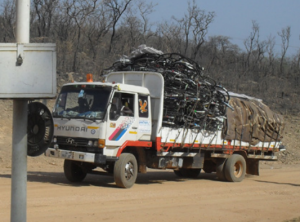
8. The partnership with Pedals for Progress doesn’t just benefit those on the receiving end. Joe is an employee with WEBike, distributing bikes around the Kasoa area in the Central Region of Ghana. Thanks to his involvement with WEBike, the people of the Kasoa area now know to go to Joe for reasonably priced bicycles. The money he is making helps him support his family. He is able to afford his rent and pay for any fees that might arise from his children’s schooling.
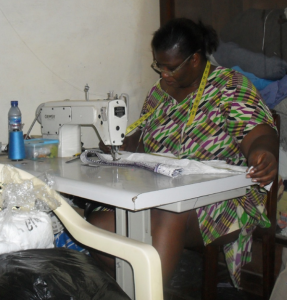 9. In Accra, the capital city of Ghana, there are many boys and girls who, after finishing high school, wish to learn to sew. Maame Yaa is a seamstress who runs an apprenticeship program training young people to be seamstresses and tailors. She would not have been able to offer this education without all of the sewing machines she received from WEBike for the children to train on. With her program as a springboard, many of Maame Yaa’s students are able to become self-employed and Maame herself profits from her business, all thanks to the sewing machines from WEBike and Pedals for Progress.
9. In Accra, the capital city of Ghana, there are many boys and girls who, after finishing high school, wish to learn to sew. Maame Yaa is a seamstress who runs an apprenticeship program training young people to be seamstresses and tailors. She would not have been able to offer this education without all of the sewing machines she received from WEBike for the children to train on. With her program as a springboard, many of Maame Yaa’s students are able to become self-employed and Maame herself profits from her business, all thanks to the sewing machines from WEBike and Pedals for Progress.

